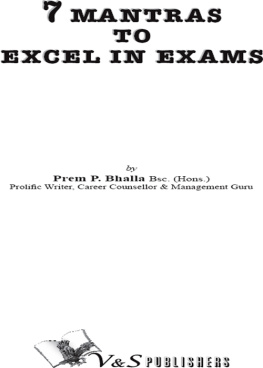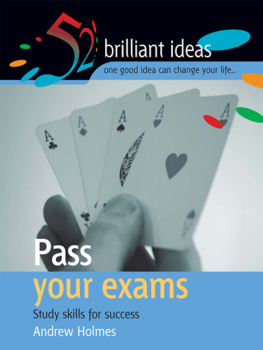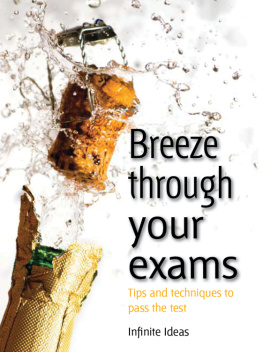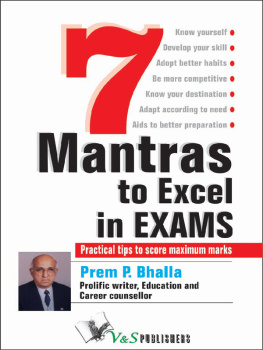
7 MANTRAS
TO
EXCEL IN EXAMS
by
Prem P. Bhalla BSc. (Hons.)
Prolific Writer, Career Counsellor & Management Guru

Published by:

F-2/16, Ansari road, Daryaganj, New Delhi-110002
 23240026, 23240027 Fax: 011-23240028
23240026, 23240027 Fax: 011-23240028
Email:
Branch : Hyderabad
5-1-707/1, Brij Bhawan (Beside Central Bank of India Lane)
Bank Street, Koti Hyderabad - 500 095
 040-24737290
040-24737290
E-mail:

Copyright: Author
ISBN 978-93-813-8419-0
Edition: April 2011
The Copyright of this book, as well as all matter contained herein (including illustrations) rests with the Publishers. No person shall copy the name of the book, its title design, matter and illustrations in any form and in any language, totally or partially or in any distorted form. Anybody doing so shall face legal action and will be responsible for damages.
Dedicated to
Rajiv and Rima
who are guiding their children
to excel in exams
CONTENTS

Preface

Exams play a major role in the lives of all people. One is confronted with them on joining school. This continues up to college and even later. Entry to many vocations, both at the higher and lower levels, is dependent upon exams. Even in adult life, where learning needs to be updated regularly, exams play an important role in achieving success.
In school, students are taught a variety of subjects to equip them for adult life. However, no school teaches them how to excel in exams. Most students learn through hit-and-miss methods. Some learn it late. Many never learn it at all. It is unfortunate that youngsters are deprived of this knowledge when even those with an average IQ can excel in exams.
An effort has been made through 7 Mantras to Excel in Exams to guide youngsters to rise step by step and excel in exams. Throughout the book exercises are given so that a person can learn through practise. After each step, Points to Ponder will help one perfect a technique. Many suggestions are given to help students gain confidence and a new insight to appear in exams.
Discover the 7 Mantras. Success awaits you. Go ahead and excel in your exams!
Prem P. Bhalla
MANTRA 1
Know Your Destination

Why are you preparing and appearing for exams? What is your goal? Unfortunately, most students are unable to answer these simple questions. They fail to explain why they are studying in school or college. Those who answer explain they are doing so to obtain a certificate, degree or diploma. And why do they need these? To them, these are symbols of being educated and through these they hope to follow a reasonable vocation and achieve a respectable position in society.
But the real purpose of going to school and college is not to obtain certificates and degrees, but to get educated. The word education is derived from the Latin educe, which means to bring forth from within. Education is the process of preparing a person to use personal capabilities buried deep within. When one knows the purpose of education, and appears for exams that are a part of the process, the person becomes aware of his destination.
At every level of study there will be exams. Written exams, exams in practical work, viva voce, group discussions, interviews, health check-ups and a variety of other tests. Each of these is planned for a particular purpose. To prove your profciency, you will need to understand the purpose of the exams and qualify in them. Lets proceed step by step to know our destination.
Mantra 1 : Step 1
Do We Need Exams?

Exam is an informal abbreviation of the word examination. An examination is a formal test of knowledge or ability in a subject or skill. It can also be a test of the qualifications or progress of a person.
An exam is nothing new to any educated person. As soon as one enters a school, and learns the first few alphabets, a test soon follows. The teacher wants to ascertain whether the student has learnt what was taught. New lessons are taught as the student progresses. More difficult tests follow. The word test is soon replaced by the word examination. With frequent use, the word has simply been abbreviated to exam.
Exams Begin Early
Even before a child joins school, s/he is not spared from being tested. The mother and father of the infant take pride in making the baby sit, crawl, stand up and take its first unsteady steps. They also take pride in the childs smile and laughter, just as they are happy when the child says Ma or Pa for the first few times. The childs abilities are freely tested before friends and relatives and it is a matter of pride and happiness for the parents when the child responds.
When children grow up and advance to higher classes, the number of subjects taught increases and so does the frequency and number of exams. There are the quarterlies, the mid-year and the final exams. That is when children question the very concept of exams. Who devised exams? Do we really need them? Is it not enough to impart the necessary knowledge and leave the rest to the person concerned? That may appear to be a reasonable way of looking at the problem, but in a civilised society it is not practical.
The Need for Exams
Lets take a look at some interesting newspapers headlines:
Over 120,000 to appear for the preliminary PCS exam in Uttaranchal.
26,000 students apply for 120 seats in Management College.
Over 100,000 students sit for Common Admission Test (CAT).
Uttaranchal is a small state with only 13 districts. How many youth can possibly be recruited in the Public Civil Service to administer these districts? With 120,000 aspirants, can there be any other way to shortlist the best candidates than through an exam?
The Management College has 120 seats for various courses. Can it ever accommodate 26,000 aspirants? The Common Admission Test was introduced to ensure that the most capable youngsters were admitted into prestigious institutions that provide the future administration of the countrys commerce and industry.













 23240026, 23240027 Fax: 011-23240028
23240026, 23240027 Fax: 011-23240028
